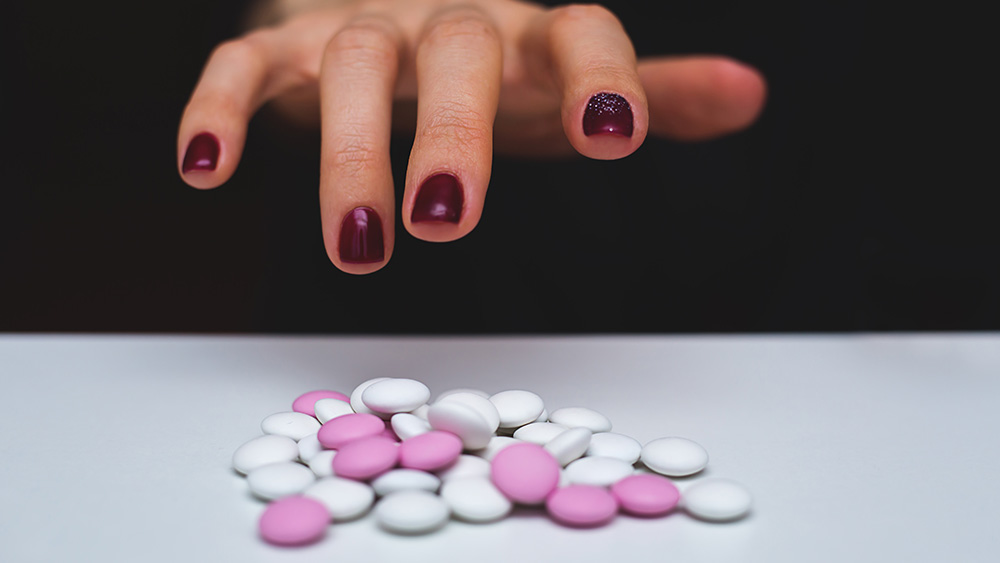Study finds that nearly 1/3 of older patients prescribed opiate pain medications for non-surgical conditions suffer harmful outcomes
01/13/2019 / By Ellaine Castillo

Opioids are some of the most commonly prescribed pain medications in the world. Unfortunately, this class of drugs is prone to misuse and has even been associated with many adverse side effects. In a recent study by Northwell Health physicians, it was found that older patients who took opiate pain medications for non-surgical conditions suffered from negative outcomes like needing to be restrained and catheterized in the bladder.
Side effects associated with opioid use can range from mild to severe. Some of its most common side effects include constipation, sleepiness, nausea, vomiting, impaired thinking, respiratory problems, and sexual dysfunction. Over time, people who constantly use opioids may develop an addiction to the drug, which manifests in increased tolerance and in withdrawal symptoms upon termination of use. Prolonged exposure causes the body to adapt to the drug making it more tolerant so that the normal dose used isn’t enough to achieve the desired effect. Meanwhile, withdrawal symptoms can include muscle and bone pain, insomnia, vomiting, cold flashes, involuntary leg movements, diarrhea, and restlessness.
In this study, the researchers wanted to determine the effects of opioid use on elderly patients taking them for non-surgical conditions, such as congestive heart failure, arthritis, or chronic obstructive pulmonary disease (COPD). To do this, they evaluated data from over 10,500 participants who were older than 64 years old and were hospitalized during the period of the study.
“We are uncovering the prevalence of opiate use in chronic illnesses, which is a factor we hear about in the news daily as Americans are battling an opioid epidemic. This is one of the first studies to demonstrate that opiate prescribing during hospitalization is associated with poor short-term outcomes,” said Dr. Maiti who is a fellow at Northwell Health and the first author of the study.
Almost thirty percent of the observed participants received opiates while hospitalized. The results showed that these patients had a higher risk of experiencing negative outcomes compared to those who did not receive opiate pain medications. Some examples of the observed negative outcomes include the need to be restrained, taking no nutrition by mouth, requiring bladder catheters, and orders for bed rest. Furthermore, patients taking opiates stayed in the hospital longer than those who didn’t and often needed to be readmitted.
Overall, this study shows that opiate pain medications should be avoided unless completely necessary since they can cause poor short-term outcomes. To reduce the use of these medications, the authors of suggest using alternative pain management options like acupuncture, tai chi, heat therapy, and exercise. (Related: What can we say about a system that promotes Opiates that have Killed 165,000 Americans?)
Herbal remedies for pain
Other ways to manage pain include the use of herbal remedies such as the following:
- Ginger — Ginger has potent anti-inflammatory properties that are even better than drugs like ibuprofen in treating arthritis. It works by preventing the formation of pro-inflammatory compounds like prostaglandins and leukotrienes. Moreover, ginger exhibits antioxidant effects that also aid in relieving pain.
- Turmeric — Curcumin is a compound found in turmeric that is known for its potent anti-inflammatory properties. Studies have also shown that this spice has anticancer effects and that it can improve circulation.
- Capsaicin — This compound, which is derived from chili peppers, reduces nerve, muscle, and joint pain by preventing substance P from transmitting pain signals.
- Valerian root — A cup of valerian tea relieves pain by reducing nerve sensitivity. This drink can also help you if you suffer from insomnia, irritability, stress, and anxiety.
For more news articles on natural alternatives for opiate pain medications, visit NaturalMedicine.news.
Sources include:
Tagged Under: addiction, negative outcomes, opiate pain medications, opiates, Opioids, Pain pills, painkillers



















